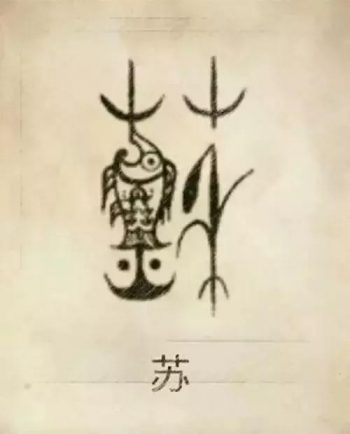The Su(sū) surname, a family name that carries the historical memory of Chinese civilization for thousands of years. From its origins as a tribal totem during the Xia and Shang dynasties to its prominence as a literary powerhouse during the Tang and Song dynasties, the evolution of the Su surname is not just a tale of a family name but a microcosm of the multicultural integration of Chinese civilization.

Ⅰ、Origins and Early Development of the Su Surname
The Su surname has a rich and diverse origin story, reflecting the multicultural tapestry of Chinese history:
1. Descendants of the Yellow Emperor
The Su surname traces its roots to Zhuanxu, a grandson of the Yellow Emperor. Zhuanxu's descendants, known as the Kunwu clan, were granted the territory of You Su (modern-day Huixian, Henan) during the Xia Dynasty. The clan adopted the purple perilla plant as their totem, marking the earliest origin of the Su surname.
2. Take the country as the surname
During the early Western Zhou Dynasty, Su Fensheng, a loyal supporter of King Wu of Zhou, was granted the territory of Su (modern-day Wen County, Henan). After the Su Kingdom was conquered by the Di people in 650 BCE, its people adopted "Su" as their surname.
3.Ethnic Integration
The Su surname also absorbed influences from various ethnic groups. For example, during the Northern Wei Dynasty, the Xianbei tribe's Balue clan adopted the Su surname. Similarly, during the Qing Dynasty, Manchu families like the Sujia clan also adopted the name. This multicultural integration makes the Su surname a symbol of China's "unity in diversity."
Ⅱ、Historical Figures of the Su Surname
The Su surname has produced numerous influential figures across politics, literature, and science:
1.Political Strategists
Su Qin (Warring States period): Known for his "Vertical and Horizontal" strategies, Su Qin wielded significant influence by uniting six states against the Qin.
Su Wei (Sui Dynasty): Played a key role in drafting the Kaihuang Code, which laid the foundation for the legal systems of the Sui and Tang dynasties.
2.Literary Giants
The Three Sus (Song Dynasty): Su Xun, Su Shi (Su Dongpo), and Su Zhe, collectively known as the "Three Sus," were central figures in the Tang-Song prose movement. Su Shi, in particular, is celebrated for works like Red Cliff Ode, which have become cultural landmarks.
Su Manshu (Modern Era): A multilingual poet who blended Eastern and Western literary traditions, earning the title "Revolutionary Monk-Poet."
3.Scientific Pioneers
Su Song (Northern Song Dynasty): Invented the water-powered astronomical clock and authored the Bencao Tujing, making groundbreaking contributions to astronomy and pharmacology.
Su Buqing (Modern Era): A founder of differential geometry, known as the "Eastern Father of Geometry."
Ⅲ、Cultural Significance of the Su Surname
1.Clan Culture and Traditions
Regional Prestige: The Su surname is closely associated with regions like Wugong (Shaanxi) and Zhaojun (Hebei), reflecting its historical migration patterns.
Family Teachings: The Su family emphasizes "scholarly pursuits and loyalty," as seen in Su Shi's Ode to the Three Scholars, which remains a model for Chinese family values.
2.Cultural Symbols
Su embroidery, Suzhou craftsmanship, and Huaiyang cuisine, though not exclusively created by the Su family, bear the cultural imprint of Su literati.
In Taiwan, the Su surname accounts for 1.5% of the population, with ancestral halls in Tainan preserving traditional rituals, serving as vital links to Chinese cultural heritage.
3.Global Migration
Since the Ming Dynasty, the Su surname has spread to Southeast Asia. Today, descendants of the Sulu Sultanate in the Philippines and the Su clan associations in Penang, Malaysia, maintain detailed genealogical records, making the Su surname a key subject in the study of Chinese diaspora history.
Ⅳ、Modern Influence of the Su Surname
In the era of globalization, the Su surname continues to thrive:
1.Science and Technology:
Nobel laureate Subrahmanyan Chandrasekhar, though not of Chinese descent, shares a surname that highlights the cross-cultural spread of Chinese names.
2.Cultural Industry:
Taiwanese director Su Chao-pin and Hong Kong actress Louisa So continue to promote Chinese culture through film and television, showcasing the enduring creativity of the Su lineage.
Ⅴ、Conclusion:
From the purple perilla totem in Huixian to Su Shi's poetic masterpiece Red Cliff Ode, the history of the Su surname is a living testament to the evolution of Chinese civilization. Its cultural DNA—openness to integration, innovation, and a deep sense of loyalty—embodies the resilience of Chinese culture. In the 21st century, the story of the Su surname offers a unique lens through which to understand the enduring strength of Chinese civilization.